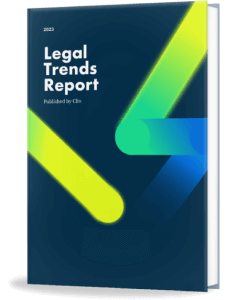We already know paralegals play an integral role at law firms everywhere. From case management and client care, to having an incredible, almost psychic ability, to read their attorneys minds—as a paralegal, you’re the backbone to a successful, efficient firm.
Unfortunately, this means the day-to-day is far from easy. The good news is that the right tools can make a world of difference.
What exactly does a paralegal do?
It depends on the firm you work for, but for majority of paralegals, typical daily duties and responsibilities include:
- Helping lawyers during trials.
- Conducting research on laws, legal articles and regulations.
- Organizing and presenting information.
- Keeping information related to cases in computer databases.
- Helping lawyers by writing reports to prepare for trials.
- Investigating facts of a case.
- Drafting correspondence and documents, such as mortgages and contracts.
- Getting formal statements and affidavits that could be used as evidence in court.
- Reviewing and summarizing medical bills/records.
- Preparing form documents for a variety of business transactions.
- Doing basic background research on parties.
- Identifying and pulling legal authorities cited in briefs.
- Taking a first pass on the review of discovery materials produced by opposing parties.
- Coordinating the scheduling of depositions.
- Managing their supervising attorney’s appointment calendar.
As you can see from the above list, there’s a lot that goes on a paralegal’s plate.
Are paralegals stressed?
Paralegals work notoriously long hours, and their tasks include everything from office management to doing case research and preparing and editing legal contracts and documents. Paralegal’s tasks have a direct impact on the outcomes of matters and cases. In addition, paralegals often work on critical documents presented in court.

Because of this, paralegals’ bosses—who are often stressed-out attorneys—can be demanding perfectionists who require an extremely high standard of work from their legal support staff.
The reality? A lot of paralegals find themselves working overtime to complete their to-do list. It’s difficult, challenging work with high-stakes. Which is why paralegals experience burnout.
While the industry is complicated and the leadership team at your firm will ultimately determine the culture and hours one works, leveraging legal technology can help streamline work and save everyone some valuable hours
How legal practice management software helps paralegals
The most successful law firms today use technology tools to work more efficiently and securely in an increasingly remote workplace.
Modern advances in technology can help streamline your day to day, and even help save time on tedious tasks.
They include:
- Electronic case filing
- Time tracking and Billing
- Online payments
- Legal research tools
- E-signature capabilities
Each of these tools help paralegals tackle their daily duties, listed above, and allows you to focus on more important tasks.
For example, instead of needing to spend an entire day printing, filing, and organizing documents for client matters and court deadlines, paralegals now have the technology to manage documents with just a few clicks.
It also allows them to easily keep track of their work and have time to focus on more important work for the firm.
With an understanding of these tools, you will be able to perform your job more efficiently and effectively, allowing you to contribute more value to your firm.
Read more in our paralegal resource hub.
5 tools for paralegals

1. Document management
As a paralegal, you already know: Documents are a large part of any paralegal’s workload. From creation to filing, to organizing, to storage, and delivering, hundreds of documents can cross a paralegal’s desk on any given day.
But, bursting file cabinets filled with old documents just add to the disorganization and can contribute to human error.
Document management technology gives the flexibility of unlimited document storage. Not to mention, you’ll be able to securely access documents from anywhere, so there’s no need to panic if something is accidentally left at home or in the office.
As well, the ability to search through online documents enables paralegals to find what they’re looking for in seconds.
Document automation tools, such as Clio Draft, streamline document creation (like letters and motions) by using information you’ve already collected (like matter details and client information) to auto-populate forms for you. Document management tools then help you safely store and access those documents, and with a cloud-based solution like Clio Draft, you’ll always stay prepared even when on the go.
While legal practice management software like Clio Manage offers a simple, all-in-one solution for dealing with legal documents, document automation tools for lawyers like LawCloud streamline document creation. Clio Manage lets you compile documents with easy-to-use templates, then keeps documents secure in the cloud, so you can edit, store, and organize files as needed.
2. Time tracking and billing
Accurate time tracking and billing are key to law firm profitability. But spending a lot of time manually monitoring time, calculating totals for each client, and dealing with billing is tedious and time consuming. It takes away from your productivity.
Billing software for paralegals helps automate bill generation, collection, and review. Online billing means that clients will receive bills instead and firms get paid faster.
For example, online payments in Clio Manage create smooth, streamlined workflows to save time and money on your billing and collections process. Clio’s built-in credit card processing system lets you automate your billing workflows and securely collect legal credit card payments—giving clients the convenient, client-centered experience they want.
If you aren’t using lawyer tools to help with time and billing, start by looking at your practice management software, which may offer features to cover this.
Clio Manage, for example, includes legal time and expense tracking and billing features.
3. Online payments
Online payments—that is, accepting credit card payments through an online platform such as Clio Payments—make it easy and more convenient for clients to pay, so lawyers can get paid faster.
The 2020 Legal Trends Report looked at data from tens of thousands of legal professionals to assess the impact of tech solutions like online payments on business performance. During the pandemic’s social distancing recommendations, online payments helped firms maintain business continuity. Firms that accepted online payments saw more growth in 2020 than those that didn’t. Specifically, firms using electronic payments saw up to 6% more growth compared to firms not using electronic payments in the early months of 2020, and collected 2% to 3% more through the summer.
4. Legal research tools
High-quality legal research is essential for your law firm’s success. Today’s tools put searchable law libraries, decisions, and other key details right at your fingertips. This way, you can conduct your legal research faster and more effectively.
Fastcase, for example, has one of the largest online law libraries in the world. Using Fastcase, which integrates with Clio, gives you remote access to documents like case law, statutes, regulations, constitutions, and more.
Effective legal research doesn’t have to be expensive, either. This post on the best free legal research tools covers more on how law firms can leverage such tools without compromising the quality of their research.
5. E-signature
Getting signatures on legal documents is vital to any case and matter. Rather than needing to sign by hand and scan documents, e-signature technology helps paralegals easily collect, sign, and store important legal documents with a simple click of a button.
Electronic signatures are more convenient to coordinate (and less back-and-forth means less room for human error). They also make legal work faster and more efficient for you, your attorney, and clients. It also saves paper (which is key as more firms are going paperless).
While e-signatures don’t work in every situation, e-signatures are legally binding in many situations, as long as they meet the right criteria.
Depending on the size of your firm and your practice area, as a paralegal, you may only need to use one or two of these systems.
Or you may need to use all five of these technologies and more including technology that helps with trust accounting. If the latter resonates, you may want to invest in an all-in-one solution such as legal practice management technology that offers all these features and even more that will help paralegals better manage their workloads.
Clio, for instance, offers easy online document signing tools as part of Clio Grow’s client intake and legal CRM software and Clio Manage’s document management functionality. Clio’s mobile e-signature functions also empower clients to sign legal documents remotely—which means a more user-friendly experience.
Final thoughts on tools for paralegals
Obviously, there’s a lot more than just these 5 we covered. But of all the tools a paralegal needs for an efficient day to day, the ones we just outlined are the most important.
Of course, it helps when everything is packaged into one so you aren’t turning to multiple tools or programs. Which is why paralegals rely on cloud based case management software.
And, of course, if you’re in the market for practice management software, we’ve got you covered with this list of the best legal technology solutions available.

